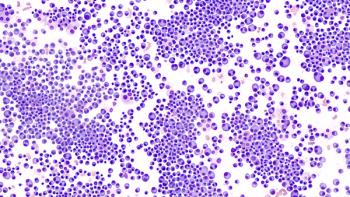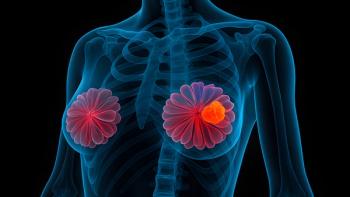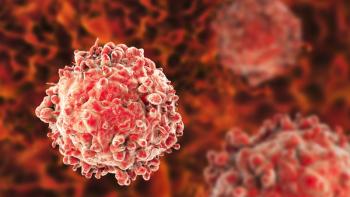
Post-Mastectomy Radiation Linked to Implant Complications for Some Women
For patients with breast cancer who have undergone breast reconstruction surgery, radiation therapy increased complications and lowered patient-reported satisfaction, according to data from a large, multicenter study presented at the 2016 San Antonio Breast Cancer Symposium. However, this was not the case for patients who received autologous reconstruction, whereby the woman’s own body tissues are used to create a new breast. Abstract S3-07
Many challenging decisions are involved for women diagnosed with early-stage breast cancer, ones that will affect their long-term disease control and quality of life, according to study author Reshma Jagsi, MD, DPhil.
Despite evidence supporting the benefits of post-mastectomy radiotherapy in some patients, “Many patients must still decide whether they feel that the benefits outweigh the risks,” explained Jagsi, professor and deputy chair in the Department of Radiation Oncology at the University of Michigan. “One of the risks of radiation therapy is that it may affect the options and outcomes for breast reconstruction, which many women who receive mastectomy desire.”
This study collected medical and patient-reported outcomes data from women who were a median age of 49 and diagnosed with breast cancer and elected different types of reconstruction between 2012 and 2015: 553 of these patients received radiotherapy, and 1461 patients did not. About 38% and 25% of the patients who did and did not receive radiotherapy, respectively, received autologous reconstruction, and the rest received implant reconstruction.
From there, researchers determined whether radiotherapy was associated with complications developed post-reconstruction, such as hematoma or wound infection. They also measured patient satisfaction using a BREAST-Q patient-reported outcome instrument, 1 and 2 years after reconstruction.
At 1 year of follow-up, 28.8% of patients who had radiotherapy and 22.3% who did not, had at least 1 of the measured complications. At 2 years of follow-up, 34.1% and 22.5% of those who did and did not receive radiotherapy, respectively, experienced a complication with their breast reconstruction.
After accounting for several variables, the researchers determined that radiotherapy was linked to more than double the odds of developing complications in patients who received implants. However, for those patients who received autologous reconstruction, radiotherapy was not associated with complications. Additionally, the BREAST-Q scores of patients who had received radiation showed significantly lower patient-reported satisfaction than those of the patients who did not receive radiation. Once more, these differences were not shown among the patients with autologous reconstruction.
Currently, well-established approaches to integrate post-mastectomy radiotherapy and breast reconstruction are lacking, noted Jagsi.
“Although women must still weigh multiple factors, including the differences in operative time and rehabilitation required for different approaches when selecting their preferred type of reconstruction, those who plan to receive post-mastectomy radiation therapy should be informed of the substantial and significant impact of radiotherapy observed in the current study among patients who received implant reconstruction.”
However, those patients who intended to pursue autologous reconstruction could be reassured by these findings: “Outcomes among patients receiving autologous reconstruction did not appear substantially worse than those of unirradiated patients by 2 years.”
Nurse Perspective
Deirdre Kiely, MS, MPA, RN, ANPNurse PractitionerPerlmutter Cancer CenterChristiana Care Health SystemWilmington, DE
Breast cancer is a common disease among American women resulting in an increased awareness of breast cancer-related issues. Despite growing attention to the informational priorities of patients in a shared decision making model of care, patients report that provision of adequate information is an unmet need throughout their cancer experience. This is especially concerning for patients with cancer who must make complex decisions about their treatment based on an understanding of medical information in an unfamiliar learning environment.
The summary of the post-mastectomy radiation therapy (PMRT) data presented at the 2016 San Antonio Breast Cancer Symposium highlights the complexity of decision making around reconstructive options after mastectomy. Although patients with early-stage breast cancer may opt for
a mastectomy, they will probably not meet the criteria to have PMRT and can consider a wider range of reconstructive options. The indication for PMRT is a patient who presents with a high risk of local recurrence where the long-term benefits of radiation outweigh potential short- or long-term adverse effects.
Researcher Reshma Jagsi, MD, DPhil, noted that patients who undergo PMRT after implant-based reconstruction report increased complications and lower satisfaction than those who undergo autologous reconstruction. An additional outcome measure of locoregional control, however, should also be considered, because this is the goal of radiation treatment.
A multidisciplinary approach to surgical planning should include the breast surgeon, plastic reconstructive surgeon, and radiation oncologist addressing preoperative consideration of risks/benefits of the planned surgery. The option of a staged reconstruction where a tissue expander (rather than the permanent implant) is placed at the time of the mastectomy and is in place during radiation would address risk of complications such as capsular contracture. The risks of delaying systemic adjuvant treatment during a longer recovery period after autologous reconstruction should also be considered.
The alignment of information needs and consideration of patient preference for involvement during comprehensive healthcare discussions makes for a more effective and meaningful provider—patient interaction. When patients are encouraged to communicate their concerns, they take an active role in tailoring their care and are generally more satisfied with the overall experience.
Newsletter
Knowledge is power. Don’t miss the most recent breakthroughs in cancer care.
















































































